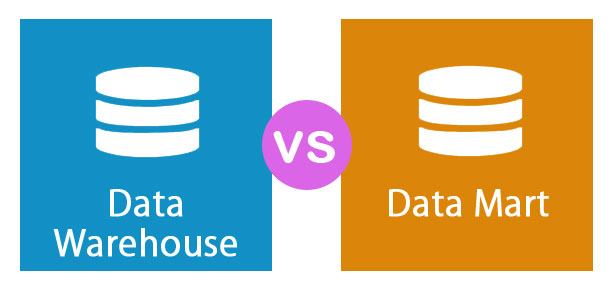Updated March 18, 2023
Difference Between Data Warehouse vs Data Mart
The following article provides an outline for Data Warehouse vs Data Mart. Data Warehouse allows data from multiple sources, whereas Data Mart is focused on only one data source per mart. Therefore, data Mart is the simpler option to design, process, and maintain data, as it focuses on one subject/ sub-division at a time. On the other hand, Data Warehouse is made up of complex designs, data processing requires complex querying to be applied, and maintenance is carried out by the Data Warehouse administrator, as the volume of data here is huge compared to a Data Mart.
Head to Head Comparison Between Data Warehouse vs Data Mart (Infographics)
Below is the top 8 difference between Data Warehouse vs Data Mart
Key Differences Between Data Warehouse vs Data Mart
Let us discuss some of the major differences:
- One of the key differences between Data Warehouse vs Data Mart is that Data Warehouse is a central repository of data which serves the purpose of decision making, whereas Data Mart is a logical subset of Data Warehouse used for specific users.
- Data Warehouse has the risk of failure because of its very large size and integration from various sources. On the other hand, a Data Mart has a lower risk of failure because of its smaller size and integration of data from fewer sources.
- Data Warehouse provides an enterprise-wide view for its centralized system, and it is independent, whereas Data Mart provides departmental view and decentralized storage as it is a subset of a Data Warehouse.
- Data Warehouse is application-oriented, whereas Data Mart is used for a decision support system.
- Data Mart stores summarized data, whereas the Data warehouse has data stored in a detailed form. In addition, the data is in a highly de-normalized form in Data Mart whereas, in Data Warehouse, data is slightly de-normalized.
- Data is stored in a single, integrated and centralized repository in Data Warehouse, whereas in Data Mart, the data gets stored in low-cost servers for specific departmental use.
- When constructing a Data Warehouse, the top-down approach is followed; while constructing a Data Mart, the bottom-up approach is followed.
- Data Warehouse is a subject-oriented, time-variant that remains in existence for a longer time, whereas Data Mart is designed for specific areas related to an organization and exists for a shorter time.
- Star schema is used while modeling a Data Mart, whereas fact constellation schema is used to model a Data Warehouse. Generally, a fact constellation schema comprises a wide range of subject areas; on the other hand, a Star schema is used for its approach of single-subject modeling in Data Marts.
Data Warehouse vs Data Mart Comparison Table
Let’s look at the top 8 Comparison:
|
Data Warehouse |
Data Mart |
| Data Warehouse stores the data from multiple subject areas. | Data Mart holds the data related to a particular area such as finance, HR, sales, etc. |
| It is a central repository of data in an organization. | It is the subset of a Data Warehouse. |
| Data is integrated into a Data Warehouse as one repository from various sources. | Data is integrated into a Data Mart from fewer sources than a Data Warehouse. |
| A data warehouse is usually modeled from a fact constellation schema. | Data Mart is designed focused on a dimensional model using a star schema. |
| It is difficult to design and use a Data Warehouse for its size, which can be greater than 100 Gigabytes. | It is comparatively easier to design and use Data Mart because of the flexibility of its small size. |
| Data Warehouse is designed for decision-making in an organization. | Data Mart is designed for specific user groups or departments. |
| It follows a top-down approach. | It follows a bottom-up approach. |
| Data Warehouse holds less de-normalized data than a Data Mart. | Data Mart stores highly de-normalized data. |
Conclusion
A Data Warehouse provides the user with a single integrated interface where decision support queries can be done easily, and a Data Mart provides a departmental view and storage. A Data Warehouse is difficult to construct for its large size, whereas a Data Mart is easier to maintain and create for its smaller size-specific to certain subject areas.
Organizations can work on their requirements to set up Data Marts for different departments and accordingly merge them to create a Data Warehouse, or they can create a Data Warehouse first, then later, as the need arises, can create several Data Marts for specific departments. But due to certain constraints like time and cost, usually, organizations go for building Data Marts first and then merging them to create a Data Warehouse.
Cloud Computing technology has provided the advantage in reducing the time and cost to effectively build an enterprise-wide Data Warehouse. Also, as both Data Warehouse vs Data Mart contains de-normalized data, we need to find solutions for improving the query performance. Extract, Transform and Load or ETL is such a concept to extract the data from several sources, then transforming the data according to the Business requirements, and finally loading the data to a system.
Recommended Articles
This has been a guide to the top difference between Data Warehouse vs Data Mart. Here we also discuss the key differences with infographics and comparison table. You may also have a look at the following articles to learn more-




